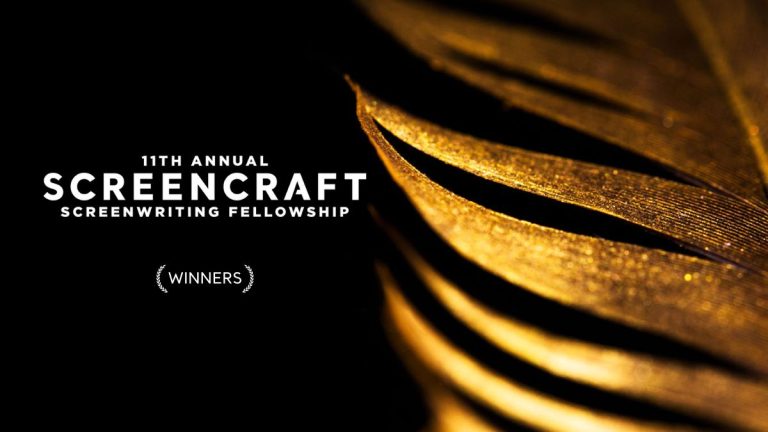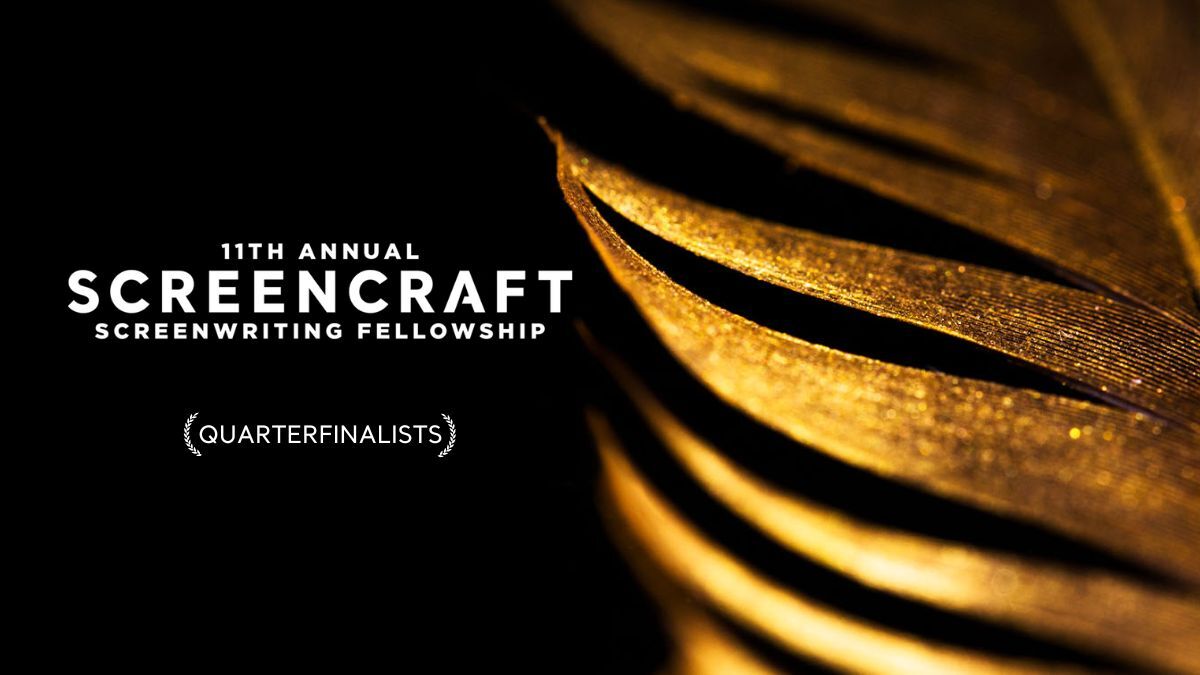7 Years of ScreenCraft Screenwriting Fellowship Wisdom

What screenwriting wisdom can screenwriters draw from the successful group of ScreenCraft Screenwriting Fellowship fellows over the last seven years?
Here we share some key takeaways, wisdom, and advice from previous ScreenCraft Fellows. We'll pull some of the best quotes from their letters and interviews and elaborate on how you can apply their words to your own screenwriting journey.
Industry Notes Don't Limit Your Vision for Your Script — They Compliment It
"I believe you need to look at notes like making a sandwich. If your original idea is the meat and bread, notes are the condiments that will complement it. You don’t shove every ingredient into a specific sandwich. The same is true for your story. Not everything (or every note) should go in a story. It’s your job to decipher what would be delicious or not. And then trust that an audience will find it satisfying." — Tevin Knight, 2020 Fellow, signed with Agent at Gersh & Managers at Kaplan Perrone
Screenwriters often cringe at the thought of receiving industry notes for their screenplays through coverage, consultation, or while on writing assignments. Notes are there to enhance your script — not limit it. And when you're writing on assignment, it's part of the collaboration with your producers and development executives. And yes, collaboration is about compromise and necessities. Some notes are necessary applications and changes that the production company needs on their end. Other notes are just about complimenting your screenplay and can be discussed, applied, or molded into even better options. Embrace notes. Don't fear them or push up against them. It's all part of the collaborative process.
Keep the Faith
"No matter where you are now, regardless of whatever you have lost up until this point, you can still find that bit of luck that’ll turn it all around if you only take a chance on yourself. So what are you waiting for?" — Lauren Conn, 2020 Fellow, signed with Manager at Good Fear Film + Management
It's very easy to sit by the wayside and stew in your own self-pity, wondering why you never can catch that big break. You need to keep the faith, keep writing, and keep trying to get your work out there. It is a guarantee that failure and rejection will come your way in a seemingly endless fashion. That's the journey. You decide to learn from that failure and rejection that will help you evolve as a screenwriter. And it's about how often you put yourself out there that will determine when that next stroke of luck will turn your screenwriting journey around. Sign up for the Fellowship and see if it's your time!
Industry Meetings Aren't a Job Interview, Test, or Something to Mess Up
"My first general is with screenwriter Peter Chiarelli (Crazy Rich Asians, The Proposal). Peter greets me from his office with a disarming smile and instantly puts me at ease. This is not a job interview, a test, or something to mess up. It’s merely two people having a chat about the industry and an incredible opportunity to hear about someone’s journey to where they are today." — Lukas Hassel, 2020 Fellow
It's very easy to work yourself into a frenzy of worry and anxiety as you prepare for that first industry meeting. But you need to understand that the people you're meeting with are just like you. They, too, once started outside of the Hollywood bubble. The one amazing thing you have in common, though, is a love for cinematic storytelling. Once you treat these meetings as they should be treated — casual discussions about your work and the industry — you'll take that weight of worry and anxiety off your shoulders and just be yourself.
Find the Right Door to Knock On
"When all our hopes and dreams rely on someone opening a door for us, well…a gentle knock on the right door is louder than banging on all doors. Winning ScreenCraft Fellowship jump-started my career. They immediately understood where I wanted to go, and what I needed and they worked with me as if my dream was theirs." — Lucy Luna, 2019 Fellow, signed with manager Kailey Marsh of Brillstein Entertainment Partners
Even beyond knocking on ScreenCraft's door (which you should), these wise words of advice can be applied to your marketing plan for your screenplays beyond ScreenCraft's fellowship and genre contests. Do your research to find the right places and people to query. Blanket cold-querying is a waste of your time — as well as a waste of time for the industry insiders you're trying to connect with. Do your research and find the right production companies, agents, and managers that develop, produce, and represent screenplays and talent like yours.
Read ScreenCraft's 7 Marketing Strategy Hacks for Screenwriters!
Don't Sweat the Rejection, Enjoy the Storytelling Ride
"It is a tense and distressing process sending your work to the void and waiting for the inevitable message that can either be soul-crushing or euphoria-inducing. But it’s a feeling that I’ve grown accustomed to. Any person who has ever been in a situation in which their work is being examined and, for lack of a better word, judged, knows exactly that feeling you have in your stomach that can sometimes be confused with hunger and/or crippling anxiety that stops you from being able to do the very basic things in life like breathing. But throughout the process, I’ve always felt hopeful and fulfilled because I was and I still am doing what I love to do best, which is telling stories. Storytelling is in and of itself a true pleasure. The recognition and the affirmation are the cherries on top." — Elie El Choufany, 2019 Fellow, signed with APA Agency
Every screenwriter knows what it is like to wait for that recognition and affirmation. The truth is that it is out of your control. Beyond honing your craft to the point where you're writing the best possible screenplays you can, you can't control who will bite and who is going to reject. Take solace in knowing that you're doing what you (hopefully) love — you're telling cinematic stories. If you develop your craft enough, the recognition and affirmation will come.
Ask Yourself, "Are You Ready?"
"There’s a couple of different [places] where nervousness could come from. Do you actually believe in your material? Do you believe it’s good? Are your nerves coming from ‘maybe this isn’t my best?’ In which case I would say submit it when you’re happy with the material. Submit it when you’re confident in the material. Submit it when you’re confident in yourself. And if you don’t think you’re ready, ask yourself why." — Brock Newell, 2018 Fellow, signed with a Manager
The worst thing that you can do is use contests and fellowships as a way to get people to help you make the script — and you're writing — better. You should be going into those submissions with the belief that you're entering your best work. Work that you're confident in and happy with. Take the time to hone your craft. We know it's exciting to finish a screenplay. We know that your excitement makes you want to share it with the world. And that's great. However, make sure it's ready. Take a couple of weeks away from it and then come back to read it cover-to-cover. If it's not your absolute best effort and if you haven't challenged yourself to make it even better, do yourself a favor and keep working on it. Industry insiders don't want to read a script from a writer that needs help to become a better writer. They want to read scripts that are ready to go — or at least meet writers that have taken the time to be the best screenwriter they can possibly be.
Don't Be Precious About Your Own Writing
"I was a few months away from finishing grad school, and I knew I was going to take the plunge and move to Los Angeles — I was terrified. At the time, I had zero prospects. I didn’t expect anything to happen career-wise for a few years but I wanted as much momentum as possible heading into LA, so I polished up a few scripts and started frantically submitting them to contests. Preparing for these contests was most beneficial in how I was forced to sharpen my ability to be an editor of my own writing. I had to depend on a critical eye as the last line of defense before submitting. My thinking was, 'If I want any chance of making it, I can’t be precious about my writing.' So, I wasn’t. And I’m still not." — Davia Carter, 2018 Fellow, staffed writer on USA’s TV show QUEEN OF THE SOUTH
The pinnacle of your screenwriting journey will be when you can get to the point where you're able to be as objective about your work as possible. And the sooner that you're able to do that, the better. That's what it takes. It's great to get feedback from peers, consultants, and mentors. But at some point, you're going to have to not rely on that crutch. You're going to have to rely on yourself. Be your own harshest critic. Force yourself to kill those darlings that you need to kill to make your script better.
Don't Chase Contest Cash Prizes, Chase Industry Connections
"Before winning the ScreenCraft Fellowship I had won and placed in a handful of contests. It was exciting to be able to say I had won something, but the worth of winning basically stopped there. Yes, it was something I could put on a resume, but that was pretty much it. Sometimes the win came with award money (which is, as any writer knows, hugely appreciated), but there was no tangible way in which winning contests helped me further my writing career. Enter, the ScreenCraft Fellowship." — Anna Klassen, 2017 Fellow, signed with her manager at Writ Large Management and with an agent at WME
When you're looking to enter any contests or fellowships, focus less on what monetary prizes are offered. And don't simply chase bragging rights placements that you can put on your query letter, as far as winning this or that local festival contest. Focus on contests and fellowships that can provide you connections with true industry power players. Hollywood access is far more valuable than any prize money or bragging rights. That should be your main objective — gaining access through well-connected contests and fellowships.
Avoid the Screenwriting Burnout
"I put myself on a schedule when deadlines approach. Conversely, I also set aside time for life and myself, time not to write. Working a full-time job and participating in two writing groups, my time is limited. If all I did was hang out at my desk by myself, I’d be miserable." — Nancy Duff, 2016 Fellow
It's very easy to burn yourself out as a screenwriter. You've read constant screenwriting advice from pundits and gurus saying that you need to sit at a desk for hours every single day and write, write, and write. Nothing could be further from the truth. You don't need to burn yourself out. And the truth is that most people trying to break into the industry as a screenwriter have full-time jobs or are going to school. Beyond that, you need to pay attention to your mental health as well. Find time for life and yourself. You'll quickly see that doing so informs your writing and the characters you create. And remember, writing isn't about typing. You can write in your head as you go on walks, runs, bike rides, car rides, etc. Don't burn yourself out sitting in front of the computer endlessly.
There's No Single Correct Formula to Writing a Script
"I attended a panel where six different writers spoke about their writing processes and each had a completely different process from one another. It was a light bulb moment. I realized that there’s no formula or one correct way to write a script — that everyone uses the process that best helps them. Just use the system that works for you, whether it’s using index cards, a detailed outline, or sitting down and writing it out longhand." — Heidi Willis, 2016 Fellow
You've read and studied screenwriting books, seminars, panels, courses, and interviews with industry professionals, gurus, and pundits telling you their preferred writing process that leads to success. There's no single formula to utilize. There's no correct writing process that guarantees success. The best you can do by studying those things is seek out ideas for processes that work for you and toss the rest. Create your own screenwriting technique by not abiding by someone else's technique.
ScreenCraft's Screenwriting Fellowship Fast-Tracks Your Career
"[ScreenCraft] put me in front of more people in one day than I’ve been able to meet in 12 years." — Jeffrey Field, 2015 Fellow
Can you go out and create your own leads, network, and industry contacts? Of course. But sometimes, you can save yourself years of time, effort, and anguish by finding that right door to knock on. ScreenCraft's Screenwriting Fellowship can help you fast-track your screenwriting career by introducing you to more industry insiders in a shorter period of time.
Past ScreenCraft-winning writers have been hired by producers, optioned their projects to major studios, and signed with top representatives at CAA, WME, 3 Arts Entertainment, United Talent Agency, Anonymous Content, Paradigm Talent Agency, Untitled, ICM, Writ Large, Bellevue Productions, Lit Entertainment, and many others.
So get those scripts ready. Be your best critic. And knock on ScreenCraft's door. If the time is right, you can fast-track your career and get a step closer to that screenwriting dream.
Ken Miyamoto has worked in the film industry for nearly two decades, most notably as a studio liaison for Sony Studios and then as a script reader and story analyst for Sony Pictures.
He has many studio meetings under his belt as a produced screenwriter, meeting with the likes of Sony, Dreamworks, Universal, Disney, Warner Brothers, as well as many production and management companies. He has had a previous development deal with Lionsgate, as well as multiple writing assignments, including the produced miniseries Blackout, starring Anne Heche, Sean Patrick Flanery, Billy Zane, James Brolin, Haylie Duff, Brian Bloom, Eric La Salle, and Bruce Boxleitner, and the feature thriller Hunter’s Creed starring Duane “Dog the Bounty Hunter” Chapman, Wesley Truman Daniel, Mickey O’Sullivan, John Victor Allen, and James Errico. Follow Ken on Twitter @KenMovies
For all the latest ScreenCraft news and updates, follow us on Twitter, Facebook, and Instagram.
Tags
Get Our Screenwriting Newsletter!
Get weekly writing inspiration delivered to your inbox - including industry news, popular articles, and more!




























